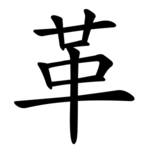Radical 177
Appearance
| 革 | ||
|---|---|---|
| ||
| 革 (U+9769) "leather, rawhide" | ||
| Pronunciations | ||
| Pinyin: | gé | |
| Bopomofo: | ㄍㄜˊ | |
| Wade–Giles: | ko2 | |
| Cantonese Yale: | gaak3, gaap3 | |
| Jyutping: | gaak3, gaap3 | |
| Japanese Kana: | カク kaku (on'yomi) かわ kawa / あらた-める arata-meru (kun'yomi) | |
| Sino-Korean: | 혁 hyeok | |
| Hán-Việt: | cách | |
| Names | ||
| Japanese name(s): | 革偏/かわへん kawahen | |
| Hangul: | 가죽 gajuk | |
| Stroke order animation | ||
 | ||
Radical 177 or radical leather (革部) meaning "leather" or "rawhide" is one of the 11 Kangxi radicals (214 radicals in total) composed of 9 strokes.
In the Kangxi Dictionary, there are 305 characters (out of 49,030) to be found under this radical.
革 is also the 179th indexing component in the Table of Indexing Chinese Character Components predominantly adopted by Simplified Chinese dictionaries published in mainland China.
Evolution
[edit]-
Small seal script character
Derived characters
[edit]| Strokes | Characters |
|---|---|
| +0 | 革 |
| +2 | 靪 |
| +3 | 靫 靬 靭JP (=韌 -> 韋) 靮 靯 靰 靱 (=韌 -> 韋) |
| +4 | 靲 靳 靴 靵 靶 靷 靸 靹 |
| +5 | 靺 靻 靼 靽 靾 靿 鞀 鞁 鞂 鞃 鞄 鞅 鞆 |
| +6 | 鞇 鞈 鞉 (=鞀) 鞊 鞋 鞌 (=鞍) 鞍 鞎 鞏 鞐 鞑SC (=韃) 鞒SC (=鞽) |
| +7 | 鞓 鞔 鞕 鞖 鞗 鞘 鞙 |
| +8 | 鞚 鞛 (=琫 -> 玉) 鞜 鞝 鞞 鞟 鞠 鞡 |
| +9 | 鞢 鞣 鞤 鞥 鞦 鞧 鞨 鞩 鞪 鞫 鞬 鞭 鞮 鞯SC (=韉) 鞰 (=韞 -> 韋) |
| +10 | 鞱 鞲 鞳 鞴 鞵 (=鞋) 鞶 鞷 |
| +11 | 鞸 鞹 鞺 鞻 |
| +12 | 鞼 鞽 鞾 鞿 |
| +13 | 韀 韁 韂 韃 |
| +14 | 韄 韅 |
| +15 | 韆 韇 韈 (=襪 -> 衣) |
| +17 | 韉 |
| +21 | 韊 |
Sinogram
[edit]The radical is also used as an independent Chinese character. It is one of the Kyōiku kanji or Kanji taught in elementary school in Japan.[1] It is a fifth grade kanji.[1]
References
[edit]- ^ a b "The Kyoiku Kanji (教育漢字) - Kanshudo". www.kanshudo.com. Archived from the original on March 24, 2022. Retrieved 2023-05-06.
Literature
[edit]- Fazzioli, Edoardo (1987). Chinese calligraphy : from pictograph to ideogram : the history of 214 essential Chinese/Japanese characters. calligraphy by Rebecca Hon Ko. New York: Abbeville Press. ISBN 0-89659-774-1.
External links
[edit]Wikimedia Commons has media related to Radical 177.

